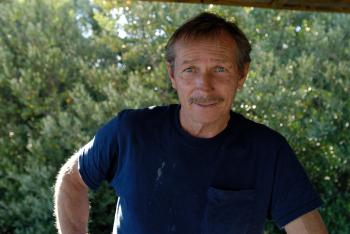Ronnie Beckham

In Their Own Words
Series of interviews conducted for the documentary In Their Own Words: Perseverance and Resilience in Two Florida Fishing Communities.
National Capital Contracting
Ronnie Beckham is a third-generation commercial fisherman who now is involved in clam aquaculture. He was born and raised in Cedar Key, Florida, where he worked with his father, who was also a fisherman and used to fish for turtles. Born into a family with a rich legacy in the fishing industry, Beckham's upbringing was steeped in the traditions and practices of fishing that have been passed down through generations. His early years were shaped by the rhythms of the sea and the community of Cedar Key, a place known for its strong ties to the fishing profession and the natural environment it relies upon. Beckham's extensive experience on the water has not only provided him with a profound understanding of the nuances of commercial fishing but has also ingrained in him a respect for the ocean and its resources. Over the years, he has witnessed and adapted to the changes in the industry, including shifts in the types of fishing that sustain the local economy and the community's way of life. His personal history is a reflection of the broader narrative of Cedar Key's fishing culture, encapsulating the challenges, transitions, and resilience of a community bound to the ebb and flow of the sea.
Scope and Content Note
The interview with Ronnie Beckham offers an in-depth perspective on the life and experiences of a commercial fisherman from Cedar Key, Florida. Beckham discusses his background, detailing his growth within a community that has been historically dependent on fishing. He reflects on the significant impact of the net ban on his family and business, which necessitated a transition from traditional net fishing to clamming. Beckham shares his personal preference for net fishing over clamming and outlines the challenges associated with adapting to a new method of harvesting seafood. Throughout the interview, Beckham conveys a sense of nostalgia for the past and a deep connection to the fishing practices that have defined his family for generations. Additionally, Beckham addresses broader concerns about the future of Cedar Key, particularly in light of economic pressures such as the influx of money and development. He expresses apprehension about the potential loss of the town's traditional way of life and the displacement of long-standing community members by wealthier newcomers. The interview also touches on the changes within the fishing community, the effects of regulations on fishermen's livelihoods, and the decline of conventional fishing practices. Beckham is skeptical about the sustainability of fishing and clamming in the area and the ability of future generations to maintain the fishing tradition. The interviewer concludes by thanking Beckham for his insights, which contribute to a deeper understanding of the cultural and economic shifts affecting Cedar Key's fishing community.
Please Note: The oral histories in this collection are protected by copyright and have been created for educational, research and personal use as described by the Fair Use Doctrine in the U.S. Copyright law. Please reach out Voices@noaa.gov to let us know how these interviews are being used in your research, project, exhibit, etc. The Voices staff can help provide other useful resources related to your inquiry.
The NOAA mission is to understand and predict changes in climate, weather, oceans, and coasts, to share that knowledge and information with others, and to conserve and manage coastal and marine ecosystems and resources. The Voices Oral History Archives offers public access to a wide range of accounts, including historical materials that are products of their particular times, and may contain offensive language or negative stereotypes.
Voices Oral History Archives does not verify the accuracy of materials submitted to us. The opinions expressed in the interviews are those of the interviewee only. The interviews here have been made available to the public only after the interviewer has confirmed that they have obtained consent.
